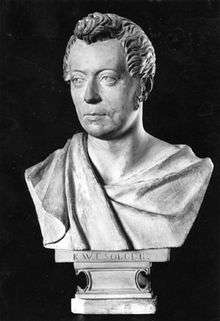Karl Wilhelm Ferdinand Solger
Karl Wilhelm Ferdinand Solger (28 November 1780, Schwedt – 20 October 1819, Berlin) was a German philosopher and academic. He is known as a theorist of Romanticism, and of irony.

Bust of Karl Wilhelm Ferdinand Solger
Biography
Solger's extensive studies included attending Friedrich Wilhelm Joseph Schelling's Darstellung meines Systems der Philosophie [Presentation of My System of Philosophy] lectures at the University of Jena in 1800–01[1] and Johann Gottlieb Fichte's "Wissenschaftslehre" lectures in Berlin 1804.[2] In 1811, Solger became professor of philosophy at the University of Berlin
Works
- Des Sophokles Tragödien [Sophocles' Tragedies] (2 vols., 1808; 2d ed., 1824)
- Erwin, Vier Gespräche über das Schöne und die Kunst [Erwin, or Four Dialogues on Beauty and Art] (2 vols., 1815) [A work on aesthetics, in which he took issue with August Wilhelm Schlegel, and which influenced both Hegel and Heinrich Heine.]
- Philosophische Gespräche [Philosophical Dialogues] (1817)
- Solger's nachgelassene Schriften und Briefwechsel [Posthumous writings and letters], edited by Tieck and Raumer (2 vols., 1826)
- K. W. F. Solger’s Vorlesungen über Aesthetik [Lectures in Aesthetics], edited by Heyse (1829)
Notes
- Walter Jaeschke, Helmut Holzhey (eds.), Transzendentalphilosophie und Spekulation: Der Streit um die Gestalt einer Ersten Philosophie (1799-1807), Meiner Verlag, 2013, p. 168.
- Tieck and Solger: The Complete Correspondence, Berlin: Westermann Company, 1933, p. 39.
gollark: It'll become possible with advances in technology, I suppose.
gollark: Well, by mentioning the game, you lost it too, so meh.
gollark: Maybe *you're* a Russian spy.
gollark: Maybe I'm not even a Russian spy.
gollark: Maybe not a double agent at all, but bluffing.
References

This article is issued from Wikipedia. The text is licensed under Creative Commons - Attribution - Sharealike. Additional terms may apply for the media files.